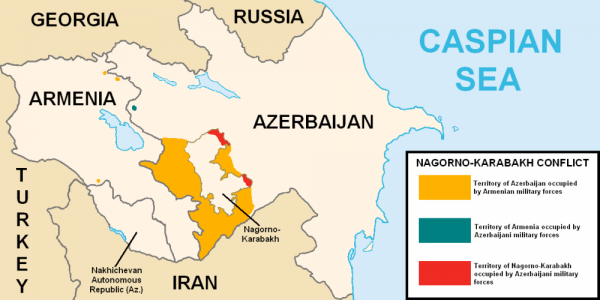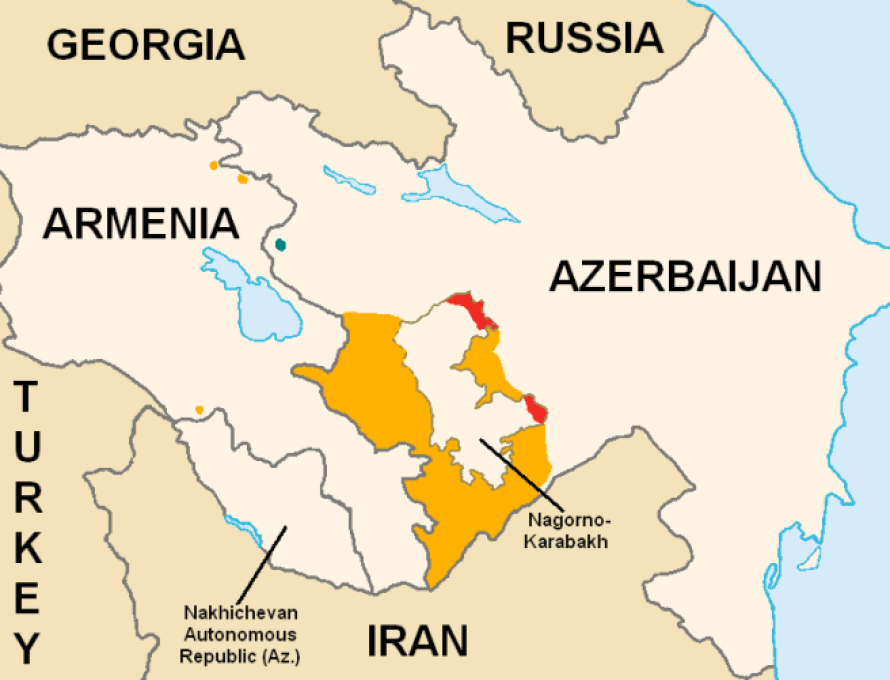ABOVYAN, Armenia – In a state of shock, Armenian Pastor Vazgen Zohrabyan couldn’t stand to enter the Abovyan City Church here for three days. Located in a town only 10 miles north of the Armenian capital of Yerevan, his 250-member church offered on social media to take in refugees of war. The response was overwhelming, and for a short time it emotionally took its toll on the pastor.
This crisis began when, in late September, fighting once again erupted between Armenia and its neighbor, Azerbaijan. The conflict centered around a contested territory called Nagorno-Karabakh – an enclave within Azerbaijan that is roughly the size of Delaware and that was largely populated by ethnic Armenians.
Although tensions have been high in the region for three decades, this was the worst conflict experienced there since the end of the “Nagorno-Karabakh War” in 1994. According to a Nov. 10 Wall Street Journal report, the latest conflict has led to 5,000 deaths, and it has forced more than 100,000 civilians to flee their homes. Fighting ended with a Russian-brokered cease-fire, Nov. 9, but according to representatives of Mission Eurasia the humanitarian crisis in the region is only getting worse.
Zohrabyan shared his story during a Zoom call with Christian journalists, organized by Mission Eurasia, Nov. 11.
“Bus drivers,” he said, “used to call me and say, ‘There is a bus full of refugees. Could you help them?’” Zohrabyan told God that, if He would send refugees their way, he would never say, ‘No,’ to them. So far, they’ve helped find shelter and food for 2,000 refugees from Nagorno-Karabakh.
And they’ve seen their share of tragedy.
One evening in the early phases of the conflict, Zohrabyan expected three refugee families to arrive at the church. But only two arrived that night. In a state of shock, they couldn’t share what happened, but they burst into tears the next day and shared how the other family’s car had been hit in a drone strike. They were all dead.
“We were shocked,” Zohrabyan said. Nevertheless, he and his church sought comfort in Christ and continued their efforts to relieve refugees. But they’re not alone. Evangelical Christians in both Armenia and Azerbaijan have made efforts to share the hope and love of Christ amid war and suffering.
Though he admits moments of shock and weakness amid the crisis, Zohrabyan adds, “Despite the situation, we have to be strong to help others.”
A religious conflict?
Missouri Baptist Director of Missions John Vernon, from the Cape Girardeau Baptist Association, supervised mission work in Central Asia for many years, and he knows well the need for the gospel of peace in both Armenia and Azerbaijan.
Since Armenia adopted Christianity as its official religion in the 4th-century, many ethnic Armenians claim to be Christians – even if they have little interest in or knowledge of the gospel. According to the Joshua Project, only 9.18 percent of the nation’s 2.9 million people are evangelical Christians. Meanwhile, Azerbaijan’s 10 million inhabitants are 84.4 percent Muslim and only 0.26 percent evangelical.
“In Central Asia it is very common for the people to equate their religious identity with their cultural/political identity,” Vernon said. “This creates significant challenges for gospel proclamation when a cultural Christian country is at war with a cultural Muslim country. Things done by each country are attached to the religion they claim to follow.”
On Oct. 17, Joel Veldkamp, writing for The Christian Post, described the conflict as religious: Armenia, one of the world’s oldest “Christian nations,” versus the larger, “Muslim nation” of Azerbaijan.
However, writing a public letter that was circulating in early October, 28 Azerbaijani pastors attempted to rebuff the perception that the conflict was religious. “Let us not mix sacred with not sacred,” the letter reads. “This is a political war, it has nothing to do with Christianity.”
Vernon encouraged Missouri Baptists to pray that the gospel and true discipleship would be understood by people on all sides of the conflict.
“It is crucial for God’s people to pray … that their identity is based on Christ and not their national or cultural identity,” Vernon said. “Pray also for God to create a door for gospel witnesses to be able to enter the region of this conflict to be ambassadors for Christ, serving as ministers of reconciliation, so that lasting peace may be attained as they are reconciled first to God and then to one another.”
Open doors for the gospel of peace
Indeed, doors for the gospel of peace have opened amid the conflict, according to evangelical Christians working both in Armenia and Azerbaijan.
“Many people in Nagorno Karabakh – they are very, very open for the Good News,” Zohrabyan said. “They really are desperate. They really need to hear the Good News. They need prayer. They need discipleship.”
Among Azerbaijani Muslims, also, doors for gospel witness are opening. One Southern Baptist missionary, who served in Azerbaijan for a decade, said that evangelical Christians in the region are seeing “unprecedented” opportunities to evangelize. Azerbaijani churches are bringing relief and hope to people in Christ’s name, he said, and they’re seeing “openness among the people.”
Stephen Currie served in Azerbaijan for two years with a Bible translation organization and currently serves as partnership facilitator for the North American Azerbaijani Network, an organization that aims to bring “the gospel to Azerbaijanis worldwide.” He told The Pathway how one church in the region got permission to provide care packs for Azerbaijani soldiers during the conflict. The care packs included New Testaments for the soldiers.
“Christians (in Azerbaijan) were part of the military mobilization,” he added, explaining that most young men are expected to serve a stint in the military, especially if they don’t plan to go to university.
Currie knew of two soldiers who asked for prayer, that they might boldly share the gospel. One soldier was given the opportunity by his commanding officer to share the gospel and pray over the entire company in Jesus’ name.
In urban communities leveled by bombing, he added, Christians shared the gospel as they provided boxes of food for those who were suffering.
“Our brothers and sisters are taking advantage of the opportunity to sow seeds of the gospel,” he said.
Currie asked Missouri Baptists to pray for healing and reconciliation in the region.
“For both sides,” he said, “this was a national trauma.
“There’s probably not a city or village in Azerbaijan that wasn’t impacted by loss of life of soldiers,” he added. “So there’s a great deal of grief.”
He also asked Missouri Baptists to pray for unity among indigenous Christians in the region and to pray that they will bold witnesses.
“Pray for gospel saturation in the land,” he said.

This map depicts the geo-political situation in Armenia and Azerbaijan before the outbreak of conflict in 2020 (Wikipedia image).

